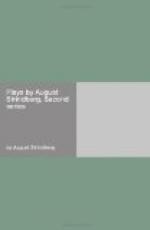Where, on the other hand, the monologue would seem unreal, I have used the pantomime, and there I have left still greater scope for the actor’s imagination—and for his desire to gain independent honours. But in order that the public may not be tried beyond endurance, I have permitted the music—which is amply warranted by the Midsummer Eve’s dance—to exercise its illusory power while the dumb show lasts. And I ask the musical director to make careful selection of the music used for this purpose, so that incompatible moods are not induced by reminiscences from the last musical comedy or topical song, or by folk-tunes of too markedly ethnographical distinction.
The mere introduction of a scene with a lot of “people” could not have taken the place of the dance, for such scenes are poorly acted and tempt a number of grinning idiots into displaying their own smartness, whereby the illusion is disturbed. As the common people do not improvise their gibes, but use ready-made phrases in which stick some double meaning, I have not composed their lampooning song, but have appropriated a little known folk-dance which I personally noted down in a district near Stockholm. The words don’t quite hit the point, but hint vaguely at it, and this is intentional, for the cunning (i. e., weakness) of the slave keeps him from any direct attack. There must, then, be no chattering clowns in a serious action, and no coarse flouting at a situation that puts the lid on the coffin of a whole family.
As far as the scenery is concerned, I have borrowed from impressionistic painting its asymmetry, its quality of abruptness, and have thereby in my opinion strengthened the illusion. Because the whole room and all its contents are not shown, there is a chance to guess at things—that is, our imagination is stirred into complementing our vision. I have made a further gain in getting rid of those tiresome exits by means of doors, especially as stage doors are made of canvas and swing back and forth at the lightest touch. They are not even capable of expressing the anger of an irate pater familias who, on leaving his home after a poor dinner, slams the door behind him “so that it shakes the whole house.” (On the stage the house sways.) I have also contented myself with a single setting, and for the double purpose of making the figures become parts of their surroundings, and of breaking with the tendency toward luxurious scenery. But having only a single setting, one may demand to have it real. Yet nothing is more difficult than to get a room that looks something like a room, although the painter can easily enough produce waterfalls and flaming volcanoes. Let it go at canvas for the walls, but we might be done with the painting of shelves and kitchen utensils on the canvas. We have so much else on the stage that is conventional, and in which we are asked to believe, that we might at least be spared the too great effort of believing in painted pans and kettles.




